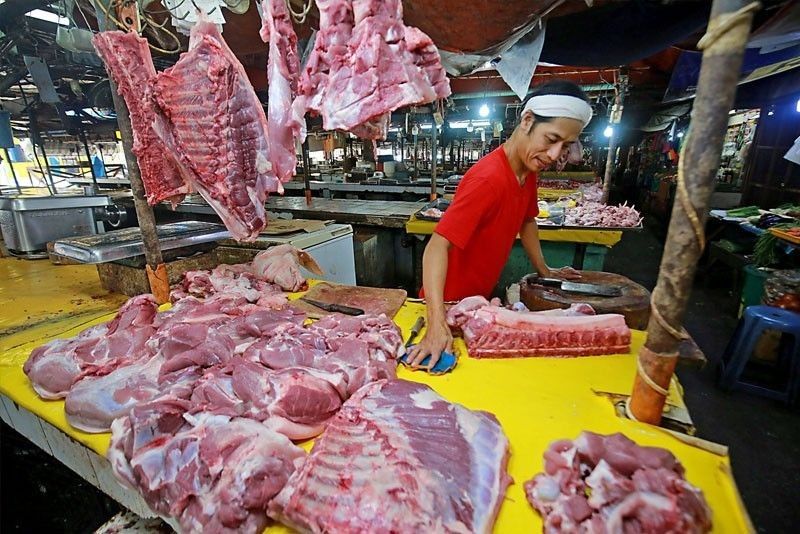Provincial Veterinarian Assures:No Pork shortage

CEBU, Philippines — There is no need to worry about the 100-day lockdown on all pork imports in Cebu as the province has enough supply of pork to meet local demands, the provincial veterinarian said.
“Actually, there is an oversupply of pork pa gani (There is actually an oversupply of pork),” said Provincial Veterinarian Doctor Rose Vincoy.
“They (Central Visayas Pork Producers) assured us last night… aside from (the assurance) they will police their ranks… they will supply our pork requirement,” she added.
Vincoy’s statement, however, contradicts the data presented during the first African Swine Fever Committee prevention meeting, which claimed that Cebu is a net importer of pork.
The province consumes a total of 63 million kilos of pork per year, 15 percent of which is imported from cities in Mindanao, Bohol, and Negros, as well as from suppliers outside the country.
Meanwhile, Governor Gwendolyn Garcia already signed Executive Order 14 or an order “prohibiting the entry into the Province of Cebu of pork and pork-related products and by-products” for one hundred days.
The EO also regulates the entry of live hogs through all ports in the province within the lockdown period.
This is in response to the possible breach of the African Swine Fever, a deadly infection exclusive to pigs that ensures a 100 percent mortality rate inside the country.
The threat followed a 20 percent mortality rate of live hogs in areas in Luzon, a significant spike from the normal 2-3 percent mortality rate.
The Department of Agriculture stressed that ASF has not been confirmed as the cause of death. Tests have been sent to Singapore and results are yet to arrive in two weeks to three months.
As a preventive measure, entries of all kinds of pork and pork-related products are deemed illegal within the 100-day ban unless it is accompanied by the necessary requirements.
Requirements for local produced pork include a Meat Inspection Certificate (MIC) from the National Meat Inspection Service (NMIS) and Veterinary Shipping Permit. Imported pork from ASF-free countries must be accompanied by a Certificate of Meat Inspection from the NMIS and VSP. As for processed pork and pork products, a Licence to Operate from the Food and Drug Administration (FDA) is needed in order to enter Cebu.
Prior to EO 14, Garcia promulgated EO 13 for the implementation of a “temporary ban of import meat products from countries infected with African Swine Fever.”
The 20 countries include China, Mongolia, Vietnam, Cambodia, Hong Kong, North Korea, Laos, Russia, Ukraine, Czech Republic, Moldova, South Africa, Zambia, Hungary, Bulgaria, Belgium, Latvia, Poland, Germany and Romania.
As of midday yesterday, only one supermarket has submitted their inventory on pork products from infected countries. The deadline was 5 p.m.
Three Deaths
Cebu City Agriculture Department head Joey Baclayaon said his office has recorded three deaths of pig as of last week.
Baclayon said he endorsed the record to the city’s Department of Veterinary Medicine and Fisheries for assessment.
“Dili hinuon ni tungod sa ASF kay dili man daghan. Tag usa or duha man,” he said.
He said he asked DVMF to check the cause of the death of the pigs.
Baclayon said the city is closely monitoring the 800 hog raisers in the city like in barangays Inayawan, Bulacao, Buhisan, Labangon, Caretta, and barangay Apas, among others.
City Veterinary Dr. Jennifer Laurente agreed with the province for the close monitoring of the entry of pigs from different parts of the country and from countries that are infested with ASF virus.
Laurente said the city would also ensure that all pigs that enter the city will have proper documents.
Luzon Situation
Meanwhile, the high pig mortality in three barangays in Rodriguez, Rizal was reportedly due to African swine fever (ASF).
A source told The STAR that ASF was the initial diagnosis of the Bureau of Animal Industry (BAI).
“They don’t want to say it because they have to abide by the protocol,” the source said. “I think they are being careful not to make a mistake. Japan, for one, made a wrong diagnosis last year.”
The Department of Agriculture (DA) said it is waiting for the result of confirmatory laboratory tests.
Blood samples were sent to a laboratory in Europe to determine the cause of death of the animals.
In a television interview, Agriculture Secretary William Dar denied that the pigs died of ASF.
“It is a virus, but no name yet. I came from the science and development world, you have to be properly informed to make good decisions,” Dar said.
“We are tracing some areas because there are pigs that were transported and transferred to other areas,” he added.
BAI director Ronnie Domingo said the screening conducted by the agency is not enough to confirm that pigs died of ASF.
“We are waiting for final confirmation before we explain things to avoid panic,” Domingo said.
Jason Cainglet, Samahang Industriya ng Agrikultura executive director, said the disease could have originated from imported meat products.
“We cannot pinpoint where... Until July, there have been imports from those included in the ban like Belgium. There was smuggling and airport measures have been lax,” Cainglet said.
Initial investigation showed that 600 pigs raised by farmers in their backyards died while around 2,000 other pigs will either be culled or under surveillance.
Barangays Macabud, San Isidro and San Jose in Rodriguez have been quarantined since Saturday.
ASF is a highly contagious hemorrhagic disease of pigs, warthogs, European wild boar and American wild pigs. Mortality rates are high as 100 percent.
In a related development, authorities intercepted two trucks carrying pigs along the Tarlac-Pangasinan-La Union Expressway in Barangay Bobonan in Pozorrubio, Pangasinan on Wednesday.
The hogs came from Tarlac and were supposed to be delivered to La Trinidad, Benguet and Baguio City. The pigs were released to the owners after inspection by a quarantine officer.
Pangasinan Gov. Amado Espino III ordered a ban on the entry of pigs into the province amid the ASF scare.
In Bataan, Gov. Albert Raymond Garcia said checkpoints to be manned by representatives of the veterinary office aside from the police should be put up to prevent the entry of affected hogs. — With Jean Marvette A. Demecillo/JMO (FREEMAN)
- Latest
























